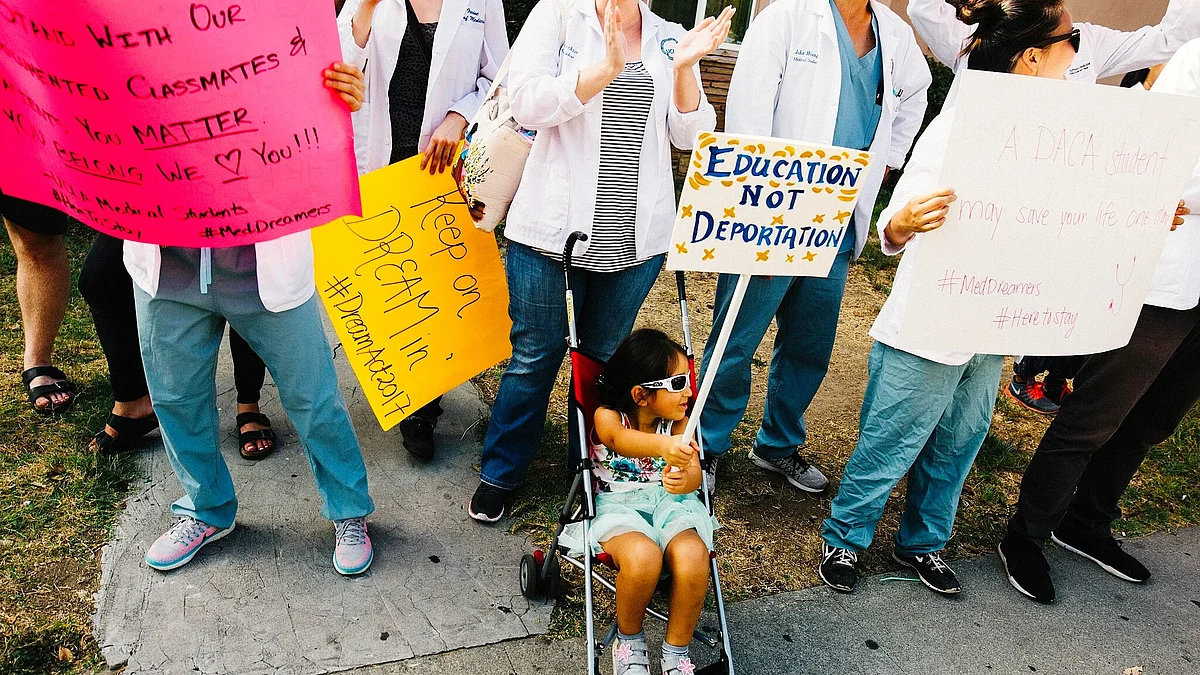US lawmakers across party lines revive legislation to stop deportation of 'documented dreamers'
These are children of long-term visa holders who risk deportation when they turn 21 despite having grown up in the US

A bipartisan group of Congress lawmakers in the US have reintroduced a legislation aimed at providing permanent residency protections to more than 250,000 young people known as ‘Documented Dreamers’, children of long-term visa holders who risk deportation when they turn 21 despite having grown up in the United States.
Senators Alex Padilla (Democrat) of California, and Rand Paul (Republican) of Kentucky joined Representatives Deborah Ross (Democrat) of North Carolina and Mariannette Miller-Meeks (Republican) of Iowa in reintroducing the America’s Children Act, a bipartisan Bill intended to close a loophole in the US immigration law that forces many immigrant children out of the country they call home once they reach adulthood.
“Thousands of Documented Dreamers grew up in the United States, completed their education here, and are contributing to our communities,” Padilla said in a statement. “Yet, because of our broken immigration system, they risk being forced to leave the only country they know.”
The Bill will allow children of long-term visa holders — who have lived in the US for at least 10 years including eight years as dependents, and who have graduated from an American university — to apply for permanent residency.
It would also lock in a child’s age at the time a parent files a green card application — preventing them from “ageing out” of eligibility at 21 — and provide work authorisation for those covered under the protection.
Supporters said the legislation is narrowly tailored and intended to retain skilled talent already embedded in American communities and workplaces. “We should not be forcing young people who were raised here, educated here, and who want to contribute here to leave the United States,” said Ross. Echoing her views, Miller-Meeks said the Bill “is about fairness, family unity, and keeping American-educated talent in our country.”
Policy gap
According to advocacy groups, over 250,000 young adults fall into this category, majority of them from families on H-1B skilled worker visas. Many arrive as children — the average age is just five — and later find themselves without legal status because green card backlogs stretch for decades.
Without relief, they must either secure another visa, often through the lottery-based H-1B system, or leave the country. “Their time spent lawfully growing up and being educated in the United States is not taken into account to extend their stay,” one background memo noted. Employers lose trained workers, families are split, and the US loses talent to global competitors.
The legislation has drawn support from advocacy networks such as Improve The Dream, founded by Dip Patel, who experienced the “age-out” problem first hand.
Patel said the Bill recognises young people who have “lived here legally for decades, but have been excluded from the American Dream due to a technicality in immigration law”.
Supporters point to cases like that of Laurens van Beek, who moved from the Netherlands to Iowa at age 6 and became a software engineer after graduating from the University of Iowa. When he turned 21, he lost his dependent visa status, and despite multiple applications, failed to secure an H-1B visa. In 2022, he was forced to leave the country. “My future in the only country I call home is obscured in red tape,” van Beek testified before the Senate Budget Committee.
Others include Roshan Taroll, who came from India at age 10 and studied in Boston. After graduating, he worked at Applied Materials, a semiconductor firm tied to the CHIPS Act.
But when he aged out of his dependent status and lost the H-1B lottery, he relocated to Taiwan to continue his job. “It saddens me to know that my skills and tax dollars will be contributing to another region when they should be contributing to the only place I call home,” he said.
And in Florida, Erin Crosbie, who immigrated from Ireland at age 7, graduated from the University of South Florida with a nursing degree during the height of the Covid-19 pandemic. Hospitals were eager to hire her, but visa restrictions left her ineligible. She eventually returned to Ireland, her family shuttering their small business in Florida after 20 years. “It was because of something that was out of my control,” she recalled. “I felt powerless.”
The political path ahead
The Bill faces long odds in a deeply divided Congress where comprehensive immigration reform has repeatedly stalled. Still, backers say the measure’s bipartisan sponsorship and limited scope could give it traction. Advocates also note the economic stakes: an estimated 87 per cent of Documented Dreamers are studying or working in STEM and health care fields, sectors where the US faces acute shortages.
“This is not just about compassion, though that matters greatly,” Paul said. “It’s about ensuring America doesn’t lose the very talent we have invested in educating.”
For families who have lived in legal limbo for years, the legislation is seen as a critical lifeline. “We cannot maintain our competitive edge on the world stage if we continue to force out American-raised and educated children,” Padilla said.
Follow us on: Facebook, Twitter, Google News, Instagram
Join our official telegram channel (@nationalherald) and stay updated with the latest headlines
